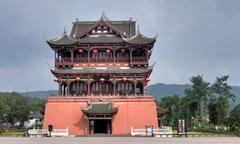
Consulate General Of The United States, Chengdu
Visiting the Former U.S. Consulate General in Chengdu: Hours, Access, and Historical Context
Date: 03/07/2025
Introduction
The U.S. Consulate General in Chengdu, established in 1985, was a cornerstone of American diplomatic engagement in southwestern China for 35 years. Serving a region home to over 200 million people—including Sichuan, Yunnan, Guizhou, Chongqing, and Tibet—the consulate played a vital role in fostering economic, cultural, and political exchanges between the United States and China. Its closure in July 2020, amid escalating diplomatic tensions, marked the end of a significant era and has left the site as a landmark of both historical and cultural interest. This guide offers a comprehensive look at the consulate’s history, its significance in U.S.-China relations, current visitor information, and alternative attractions in Chengdu.
Table of Contents
- Historical Overview
- Visiting the Former Consulate Site
- Consular Services After Closure
- Frequently Asked Questions (FAQ)
- Timeline of Key Events
- Conclusion and Travel Tips
- Sources and Further Reading
Historical Overview
Establishment and Early Years
Opened in 1985, the U.S. Consulate General in Chengdu reflected the deepening of Sino-American relations following the normalization of diplomatic ties in 1979. Chengdu was strategically selected as a regional capital and a gateway to Tibet, Yunnan, Guizhou, and Chongqing. The consulate quickly became a hub for economic initiatives, visa services, and cultural exchanges, supporting American business interests and providing assistance to U.S. citizens in the region (U.S. Embassy & Consulates in China).
Diplomatic Significance and Key Events
The consulate’s jurisdiction included politically sensitive areas such as Tibet, making it a focal point for U.S. engagement on complex issues like human rights and religious freedom. The Chengdu consulate was also the site of high-profile diplomatic activities, including visits from senior American and Chinese leaders and the 2012 Wang Lijun incident, which triggered a major political scandal in China (AP News; BBC News).
Closure and Aftermath
In July 2020, as a direct response to the U.S. closure of the Chinese Consulate in Houston, China ordered the Chengdu consulate to cease operations. The closure, completed on July 27, 2020, represented a significant downturn in U.S.-China relations. The American flag was lowered, Chinese authorities took control, and all identifying signage was removed (CNN; State Magazine). The event symbolized a broader deterioration in bilateral relations and marked the end of direct U.S. diplomatic presence in Southwest China.
Visiting the Former Consulate Site
Current Status and Accessibility
As of July 2025, the former U.S. Consulate General in Chengdu is permanently closed and under Chinese government control. There is no public access to the compound, nor are there official visiting hours or ticket requirements. Visitors may view the exterior from public sidewalks but cannot enter the premises (Wikipedia).
Photography: Discreet photography of the exterior from public areas is generally permitted, but visitors should comply with any instructions from security personnel.
Location Details
- Address: 4 Lingshiguan Road, Wuhou District, Chengdu, Sichuan 610041, China (Consulate Info)
- District: Wuhou, a central and culturally rich area of Chengdu, easily accessible by public transportation and taxi.
Visitor Guidelines
- Respect Security Measures: The site is under surveillance, and entry is strictly prohibited.
- Accessibility: The area around the compound is accessible by foot and public transit; however, there are no special visitor facilities at the consulate itself.
- Language: Most local signage is in Mandarin; consider a translation app for convenience.
- Local Laws and Customs: Avoid political discussions and always follow local regulations, especially near sensitive sites.
Nearby Attractions
If you are interested in local history and culture, consider visiting these sites in the Wuhou District and beyond:
- Wuhou Shrine (Wuhou Ci): Memorial to Zhuge Liang, renowned statesman of the Three Kingdoms era.
- Jinli Ancient Street: Traditional pedestrian street with Sichuan snacks and handicrafts.
- Chengdu Research Base of Giant Panda Breeding: Leading conservation center for giant pandas.
- Du Fu Thatched Cottage: Historical home of the celebrated Tang dynasty poet.
- Sichuan Opera and Teahouses: Experience local performing arts and tea culture (Grumpy Camel).
Consular Services After Closure
All consular services previously provided in Chengdu have been transferred to the U.S. Embassy in Beijing and other consulates in China. For visa, passport, or emergency assistance:
- U.S. Embassy Beijing
- Phone (within China): 010-8531-4000
- U.S. Embassy Beijing Website
- Additional Consulates: Guangzhou, Shanghai, Shenyang, Wuhan
- For travel safety and registration, use the Smart Traveler Enrollment Program (STEP).
Frequently Asked Questions (FAQ)
Q: Can the public visit inside the former U.S. Consulate in Chengdu?
A: No, the consulate is closed and entry is not permitted. The exterior may be viewed from public areas.
Q: Are there official tours or information plaques at the site?
A: No, there are no guided tours or official plaques. Explore local museums or online resources for more information.
Q: Where can I get U.S. consular services now?
A: Contact the U.S. Embassy in Beijing or other operational consulates in China for all services (U.S. Embassy & Consulates in China).
Q: Is photography permitted?
A: Photography of the exterior from public spaces is generally allowed, but follow local guidance and respect security.
Q: Is the site accessible for differently-abled visitors?
A: There are no visitor facilities at the compound, but the surrounding public areas in Wuhou District generally offer accessibility features.
Timeline of Key Events
- 1985: U.S. Consulate General opens in Chengdu.
- 2012: Wang Lijun incident draws international attention to the consulate.
- 2020: Consulate ordered closed by Chinese authorities, following U.S. closure of the Chinese Consulate in Houston (AP News).
- July 27, 2020: American flag lowered; Chinese officials assume control (CNN).
Conclusion and Travel Tips
The closure of the U.S. Consulate General in Chengdu marked a pivotal moment in U.S.-China relations, ending decades of direct American presence in Southwest China. While the consulate itself is no longer accessible, its history remains a testament to the complexities of international diplomacy. Visitors can explore the site’s exterior and immerse themselves in the vibrant Wuhou District, home to some of Chengdu’s most celebrated historical and cultural attractions.
Travel Tips:
- Plan visits during daylight for safety and better viewing.
- Combine your visit with a tour of nearby historical sites.
- Always adhere to local regulations and respect security measures.
- For up-to-date travel information and guided tours, consider the Audiala app.








